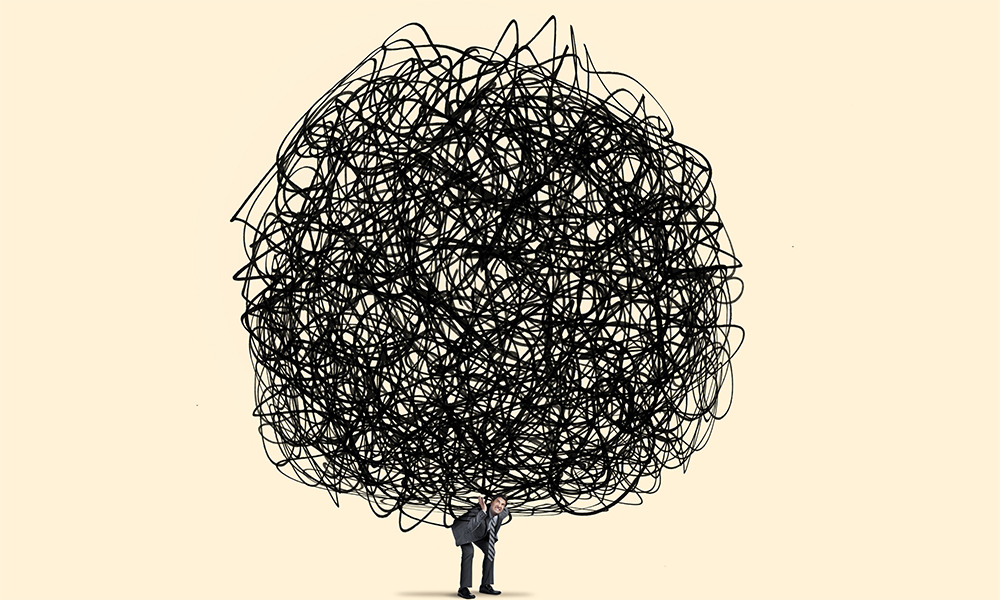Live each day as if it were your last.
I’m sure you’ve come across this statement often, be it on inspirational posters, during talk shows, or even from well-meaning friends. Forget about tomorrow, we hear; just enjoy today. It sounds profound – but if you really think about it, this might not be the best advice.
In his book, The Art of Thinking Clearly, Rolf Dobelli elaborates:
For such a clever line, it makes you none the wiser. Just imagine what would happen if you followed it to the letter: you would no longer brush your teeth, wash your hair, clean the apartment, turn up for work, pay the bills… In no time, you would be broke, sick and perhaps even behind bars.
Yet, similar mottos and slogans flourish around the world – and that’s because they appeal to our in-built desire for immediacy. The idea of now has a magnetic pull for the human brain, as validated time and again by psychological studies. When given the choice of getting $1,000 today or $1,100 after a month, most people choose to take the $1,000 right away – even though it’s a significantly smaller amount. This puzzling tendency to choose smaller, immediate rewards over larger, later gains is the result of hyperbolic discounting.
So, my message this week delves deeper into this cognitive bias: How does hyperbolic discounting work, and why is it a problem? How you can overcome this lure of instant gratification?
Thanks to hyperbolic discounting, we’re wired to discount the value of a later reward because it involves waiting – the longer the delay, the bigger the discount. As seen in the classic experiment above, even the incentive of an extra $100 doesn’t stand a chance against the seductive power of now. Contrary to all logic, we prefer immediate pleasure over future good.
Interestingly, hyperbolic discounting is at its strongest in the short term. If we expand the time frame, the results change. So, for example, when given the choice of getting $1,000 after one year or $1,100 after 13 months, most people are willing to wait an extra month for the larger sum. In the longer term, our tendency to discount declines and we make the rational decision. But in the shorter term, immediacy wins over future incentives.
Like many cognitive biases, hyperbolic discounting is a legacy of our cave-dwelling days. If an opportunity to hunt or gather food presented itself, our long-ago ancestors wouldn’t have dreamed of turning it down and waiting for something else to come along – their very survival depended on seizing the moment, not planning for the future. Even today, this evolutionary impulse lives on in our brains.
In the 1960s, Stanford psychologist Walter Mischel conducted the famous “marshmallow experiment” with a group of young children. Each child was given one marshmallow and told that they could either eat it right away or wait a few minutes and get a second marshmallow. Those of you who are parents won’t be surprised to learn that only one-third of the kids managed to wait! (For a recent restaging of the experiment, see this video.) Follow-up studies found that the ability to delay gratification correlated with stronger academic performance in later years.
In adulthood, hyperbolic discounting can have a serious impact on your finances, career, and health. Think about it: Haven’t you ever given in to the temptation of instant gratification, instead of prioritising greater future gain? Whether it’s splurging on clothes rather than saving for retirement; binge-watching Netflix late into the night before an important presentation in the morning; or choosing junk food over healthier meals day after day – we’re all guilty of giving this cognitive bias too much power over us.
Banks and credit card companies, by the way, derive immense profit from our “must have it now” mindset. Because people hate postponing fulfilment, they’re quick to rack up huge amounts of credit card debt or take out short-term loans saddled with high interest rates and default penalties. In terms of your personal finances, hyperbolic discounting poses serious dangers.
The costs of hyperbolic discounting are all too real: inadequate savings, increased debt, poor health, and shoddy work. “But it’s a flaw in my brain,” you might be thinking. “I can’t help it!” While it’s true that this is an inherent bias, that doesn’t mean you need to give it free rein. The ability to delay gratification can be learned, and it can help you make better life decisions. Trust me, your future self will thank you for making the effort.
Here are some suggestions to help you overcome your hyperbolic discounting bias:
1. Identify goals
Which of your objectives are being derailed by hyperbolic discounting? It could be a task in the short term, like the report due next week which you keep putting off in favour of browsing Facebook. Or maybe you’re struggling with a long-term aim, such a saving up to buy a house or getting into shape.
2. List excuses
Once you’ve identified future goals that matter to you, list down the excuses you make when choosing immediate pleasure over them. Seeing it in black and white will help you realise how weak most of the reasons are – be it “I work best under pressure”, “But it’s on sale!”, or “I’ll definitely start from tomorrow”.
3. Assess the past
Think back to times in the past when you used these very same excuses. How did that work out for you? Were you able to do a good job on that presentation at the last minute? Were you able to meet your annual investment target after all those expensive nights out?
4. Picture your future self
Based on your assessment of the past, visualise your future self if you continue to choose smaller, instant rewards over larger, later gains. In the article, Hyperbolic discounting: Why you make terrible life choices, Lakshmi Mani says it’s important to empathise with your future self:
You put things off to future you because it’s easy. It’s easy to assume that future you is boundless with energy, drive and motivation.
But unfortunately, that perfect vision of future you is not reality.
Try to imagine how panicky and exhausted future you will be, trying to do a week’s worth of report-writing in two days. How demotivated and overworked future you will be, trying to make up for years of not saving regularly. How many health problems future you will have to face, because you always picked television over workouts.
5. Write a letter
Next, it’s time to write a letter from your ideal future self, to your present self. Describe what it feels like to have achieved your most important goals – whether it’s receiving accolades for your stellar work, or enjoying a fit, active lifestyle. Thank your present self for resisting the urge for immediate satisfaction, so that you could build a healthier, happier, and more secure life. Keep this letter handy and re-read it when you feel the irrational tug of hyperbolic discounting.
6. Create smaller rewards
When it comes to distant goals, picturing future rewards can be inspiring – but it isn’t enough. As human beings, we crave ongoing fulfilment; without it, we lapse back into making bad choices that feel temporarily good.
To keep yourself on track, break up your lofty aim into smaller targets. For example, your 10-year savings goal can be further divided into five-year, annual, quarterly, and monthly chunks. This way, you’ll enjoy a feeling of satisfaction at regular intervals. Attach a reward to milestone moments: treat yourself to a weekend getaway if you meet your target three months in a row.
7. Pre-plan and pre-commit
When decisions are far away, we behave more rationally. That’s why it’s a good idea to plan ahead: you can structure the future in such a way that the better choice becomes the default option. Mani explains the notion of pre-committing:
Precommitment is a way to lock future you into decisions, now. You increase your chance of success by removing temptation from future you. Make it hard for your future self to back out.
Research shows that people who commit to saving portions of their future paychecks to their retirement end up saving more money than others.
That’s how subscription meal delivery systems…work. You subscribe to healthy food that shows up a week later. You make it more likely that you’ll eat healthier in a week’s time.
Take an honest look at your relationship with instant gratification. Which of your goals are being impacted negatively? What excuses do you use to justify your poor choices? And how can you use pre-commitment to make things easier for future you?
I’d also encourage you to write a letter from your ideal future self, to your present self. If you feel comfortable sharing excerpts, I would love to read them.








Comments